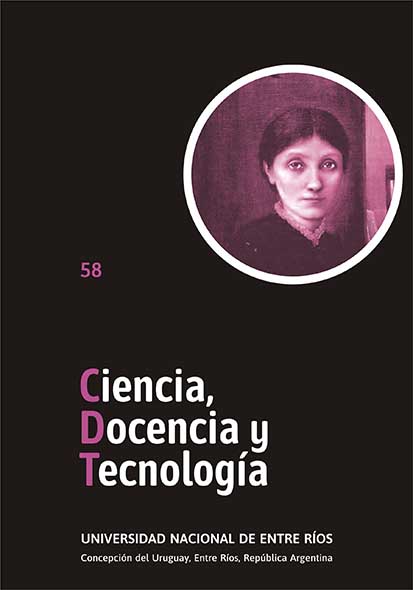Abstract
For the purpose of including Entrepreneurship and Scientific and Technological Innovation in university education, the School of Engineering of unr has conducted a survey among professors, students and graduates of the Civil, Electrical and Mechanical Engineering careers, as well as among the businesspeople related to the School. In a previous stage, people in charge of each of these careers had been interviewed. Surveys were conducted via email, while students were surveyed in person. Conclusions of vital importance were reached to achieve the insertion of Entrepreneurship as a subject in the curricula. Professors’ seniority was very important to determine their affinity with Entrepreneurship; as their teaching methodology determines the creative ability of their students. Likewise, the input from graduates and businesspeople was vital to endorse the importance of this subject.References
ALBANO, S. (2008). Metodología de la Investigación en Administración. 1ra Reimpresión. Rosario, Argentina: Editorial UNR Editora.
ALBANO, S. (2013). Consultoría y Emprendedorismo una salida profesional. Buenos Ai-res: Editorial Universidad Abierta Interamericana. 1era reimpresión.
ALBANO, S. (2014). “Competencias emprendedoras en la universidad a través de la ac-ción: aprender a emprender”. Pp. 97-116. Revista de la Escuela de Ciencias de la Educa-ción, año 10 (9), enero a diciembre de 2014. ISSN 1851-6297. ISSN en línea 2362-3349.
ALBANO, S. (2014). Competencias emprendedoras en la Universidad a través de la ac-ción: aprender a emprender (AE). Revista de la Escuela de Ciencias de la Educación, año 10 (9), enero a diciembre 2014, ISSN 18516297. ISSN 23623349 (en línea), Laborde Edi-tor, pp. 97 a 116.
ALBANO, S. y otros (2009). “El emprendedorismo en la currícula universitaria Caso: Fa-cultad de Ciencias Exactas, Ing. y Agrim. - UNR”. Conferencia Ibero-Americana de Inge-niería e Innovación Tecnológica: CIIIT 2009. Del 10/07 al 13/07 de 2009. Orlando, Florida, EE.UU.
ALBANO, S.(2006). Estilos de gestión para el emprendedor y la gestión del conocimiento para el aprendizaje organizacional y su desarrollo. 16º Congreso Nacional de Profesiona-les en Ciencias Económicas, Área V Administración; 25 al 27 octubre de 2006, Argentina.
ASTEGGIANO, D. y Cocca, J. (1997). "Nuevos desafíos académicos en carreras de In-geniería de cara al 2000”.
CHAMOUN NICOLÁS, H. (2001). Desarrollo de negocios. Agata. ISBN 9706571019.
DE LA CALLE, A. (2017). Universidad-Empresa: Transferencia e Innovación. II Jornadas Internacionales del posgrado en Iberoamérica: Posgrado Universitario. Baeza, España.
DOLABELA, F. (1999). O Segredo de Luisa. Cultura Editores Associados.
DOLABELA, F. (1999). Oficina de emprendedor. Cultura Editores Associados.
DOLABELA, F. (2005). Taller del Emprendedor, editorial Homo Sapiens- UNR, Rosario.
DURKHEIM, E. (1998). Las reglas del método sociológico. México: Ediciones Coyoacán S.A., tercera edición.
ECO, U. (1990). Cómo se hace una tesis: técnicas y procedimientos. Gedisa Ediciones.
EMERY, M. A. Propiedad intelectual Ley 11723. Editorial Astrea.
FERNÁNDEZ AGUADO, J. (2000). 1000 Consejos para un emprendedor. CIE Dossat.
FILION, L. J (1999) “O emprendedorismo como tema de estudios superiores”. Conferencia feita no evento A Universidades Formando Emprendedores, CNI-EL. Nacional, Brasilia, 05/1999.
HERNÁNDEZ SAMPIERI, R. y otros (2004). Metodología de la Investigación. Colombia: Editorial Mc Graw-Hill.
LAMBING, P. y Kuehl, C. (1998). Empresarios pequeños y medianos. México: Prentice Hall, p. 10.
MALFITANO CAYUELA, O. (1993). Recreando empresas. Buenos Aires: Ediciones Inter-oceánicas S.A., p. 6.
MENDEZ, A., Carlos,E. (1998). Metodología. Guía para elaborar diseños de investigación en ciencias económicas, contables y administrativas. Colombia: Editorial McGraw-Hill, segunda edición.
OVIEDO, P. (1995). La encuesta como texto: un enfoque cualitativo. V Congreso Español de Sociología. Granada, septiembre de 1995. Universidad de Oviedo.
Pesquisa Tecnológica – ABIPTI – Rio de Janeiro 08 a 10 de Noviembro de 1998.
Políticas de propiedad e Intelectual, Negociação, Cooperacção, e Comercialização de
SABINO, C. A. (1996). El proceso de investigación. Buenos Aires: Editorial Lumen- Hvmanitas.
SALKIND, N. J. (1998). Métodos de Investigación. México: Editorial Prentice Hall. Tercera edición.
SIERRA BRAVO, R. (1996). Tesis Doctorales y trabajo de investigación científica. Madrid: Editorial Paraninfo, cuarta edición.
SIRVENT, M.T. (1998). Ficha de cátedra III: Cuadro comparativo entre lógicas según di-mensiones del diseño de investigación. Maestría en Política y gestión de la educación. Universidad Nacional de Luján.
Tecnologia em Universidades e Instituções de Pesquisa: Análise e Proposições;
Workshop Rede de tecnologia de Rio de Janeiro. Associação Brasileira das Instituções de
ZORRILLA, A. S. y Torres, X. M. (1997). Guía para elaborar la Tesis. México: Editorial McGraw-Hill, segunda edición.
The authors retain the copyright and grant the journal the right to be the first publication of the work, as well as licensing it under a Creative Commons Attribution License that allows others to share the work with an acknowledgment of the authorship of the work and publication initial in this magazine. All content is published under the Creative Commons 4.0 international license: Attribution-Non-Commercial-Share Alike.

